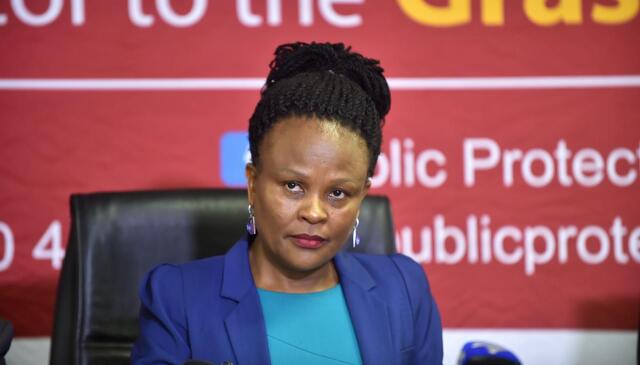Constitutional Court retained the high court ruling that Public Protector Busi Mkhwebane did not have powers to subpoena Sars to provide her with former president Jacob Zuma and other taxpayers’ personal information.
PUBLIC Protector Busi Mkhwebane has welcomed the Constitutional Court’s decision to dismiss the North Gauteng High Court’s cost order ruling against her, following her failed application to subpoena Sars to give her former president Jacob Zuma’s personal tax information.
The Constitutional Court, however, retained the high court ruling that Mkhwebane did not have powers to subpoena Sars to provide her with Zuma and other taxpayers’ personal information.
The high court decision came after Mkhwebane unsuccessfully subpoenaed Zuma’s tax information as part of her investigation into allegations that Zuma received monthly payments of R1 million from a Durban security company while he was president. The investigation stems from a complaint lodged by former DA leader Mmusi Maimane in 2018.
Mkhwebane’ spokesperson Oupa Segalwe said: “Although the Constitutional Court declined to grant the public protector direct access to appeal the high court declaratory order that a Sars official is entitled to withhold taxpayer information in terms of 11(3) of Public Protector Act read with section 69(1) of the Tax Administration Act (TAA) and the high court’s dismissal of the public protector’s counter application against the commissioner of Sars, it granted advocate Mkhwebane’s leave to appeal the high court’s order that she must pay 15% of the commissioner of Sars’ costs from her own pockets.
“The apex court also upheld her appeal in this regard and set aside the high court order on the personal costs.”
In a unanimous ruling, Justice Mbuyiseli Madlanga said the high court, in trying to justify the personal costs order, did not show that Mkhwebane exhibited egregious conduct or gross disregard for her professional responsibilities. Instead, the high court misdirected itself on facts, made conclusions of bad faith on the part of advocate Mkhwebane.
The conclusions amounted to a “leap in logic” and wanted to hold the public protector to a standard that has never been part of the South African law, a standard that was “unduly high and legally non-existent”.
“Courts must be wary not to fall into the trap of thinking that the public protector is fair game for automatic personal costs awards, considering the chilling effect these orders may have on the exercise of the public protector’s powers, including litigation where necessary,” Justice Madlanga said, echoing and affirming Mkhwebane’s long-held view on the issue.
“Axiomatically the public protector’s office is more important than any incumbent. Needless to say, as the judiciary, we must not be guilty of contributing to weakening that office by making indefensible personal cost awards. You weaken that office, you weaken our constitutional democracy. Its potency, its attractiveness to those it must serve, its effectiveness to deliver on the constitutional mandate must be preserved for posterity,” Justice Madlanga said.
Segalwe, however, said the Constitutional Court did not deal with the merits of the matter and therefore the appeal had not been decided.
“This means the door remains open for the public protector to approach the Supreme Court of Appeal as she feels strongly that the TAA, or any other law for that matter, can under no circumstances trump the Constitution.
“Her position on the matter has always been and remains that her office is entitled to have access to a taxpayer’s information for purposes of an investigation, despite the provisions of section 69(1) of the TAA, since national legislation cannot trump the Constitution, from which her office draws its original investigative powers.”
Segalwe said that with the help of her legal team, she would study the judgment and take legal advice. She would also consider the Constitutional Court’s advice on challenging the constitutionality of the TAA, particularly section 69(1).
– Political Bureau








